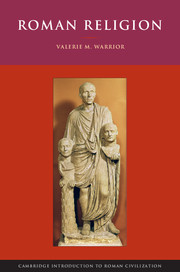Book contents
- Frontmatter
- Contents
- List of Illustrations and Maps
- Preface
- Acknowledgments
- 1 The Gods and their Worship
- 2 Divination, Prayer, and Sacrifice
- 3 Religion and the Family
- 4 Religion and the State
- 5 Religion and War
- 6 The Calendar, Festivals, and Games
- 7 Official Attitudes toward Foreign Cults
- 8 Magic and the Occult
- 9 Becoming a God
- 10 The Jews and Christianity
- Chronology
- Maps
- Gods
- Glossary
- Ancient Sources
- Bibliography
- Illustration Credits
- Index
3 - Religion and the Family
Published online by Cambridge University Press: 05 February 2015
- Frontmatter
- Contents
- List of Illustrations and Maps
- Preface
- Acknowledgments
- 1 The Gods and their Worship
- 2 Divination, Prayer, and Sacrifice
- 3 Religion and the Family
- 4 Religion and the State
- 5 Religion and War
- 6 The Calendar, Festivals, and Games
- 7 Official Attitudes toward Foreign Cults
- 8 Magic and the Occult
- 9 Becoming a God
- 10 The Jews and Christianity
- Chronology
- Maps
- Gods
- Glossary
- Ancient Sources
- Bibliography
- Illustration Credits
- Index
Summary
Privately they shall worship those gods that they have duly received from their ancestors. In cities they shall have shrines; in the country they shall have groves and places for the Lares. They shall preserve the rites of their family (familia) and their ancestors (patres).
(Cicero, On the Laws 2.19)The sacred rites of individuals (sacra privata) shall endure for ever.
(Cicero, On the Laws 2.22)In a Roman context, “family” extends beyond our usual concepts of nuclear and extended family to include household slaves and their offspring. The laws of the Twelve Tables deriving from the mid-fifth century BCE reveal the extent of patria potestas, the power of the paterfamilias (father of the family) who had the power of life or death over the entire household. As is apparent in the prologue to Plautus' Pot of Gold, it was the duty of the paterfamilias to tend the family cult, maintain the pax deorum, and so ensure the well-being of the whole household. Cato's prayer of purification for his farm (On Agriculture 141) included the welfare of his crops and trees, the protection and welfare of his shepherds and their flocks, and good health and strength for himself, his family (domus), and his household (familia). Also included in the duties of the paterfamilias was the conducting of rituals concerned with birth, marriage, and death. Because these rituals were performed within the family and were not a matter of public record, the surviving literary evidence is scanty.
- Type
- Chapter
- Information
- Roman Religion , pp. 27 - 40Publisher: Cambridge University PressPrint publication year: 2006



